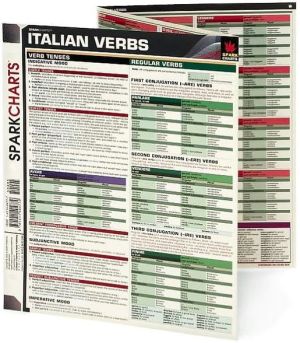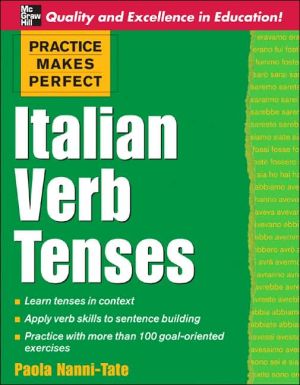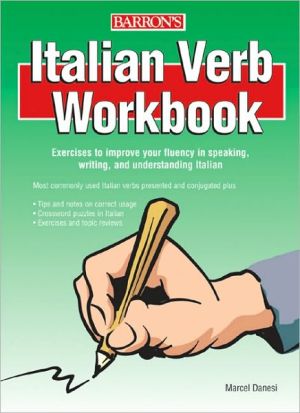750 Italian Verbs and Their Uses
Essential grammar taught simply and directly . . .\ 750 Italian Verbs and Their Uses gives you the backbone of language study-correct verb usage-by showing verb conjugations in their contexts.\ To understand the value of such an approach, consider the English verb "to hold," the meaning of which changes dramatically when used in such expressions as "hold on," "hold up," "hold off," and "hold down." In Italian, as students of the language have perennially learned to their frustration, the...
Search in google:
Essential grammar taught simply and directly . . . 750 Italian Verbs and Their Uses gives you the backbone of language study-correct verb usage-by showing verb conjugations in their contexts. To understand the value of such an approach, consider the English verb "to hold," the meaning of which changes dramatically when used in such expressions as "hold on," "hold up," "hold off," and "hold down." In Italian, as students of the language have perennially learned to their frustration, the changes are confusing and apply to many verbs. Now you won't have to guess how a verb is used in a sentence: 750 Italian Verbs and Their Uses gives you all the correct variations and grammatical interrelationships. Correct usages are illustrated in common phrases and idiomatic expressions. Unusual or troublesome expressions are emphasized throughout. And special attention is given to reflexive verbs (often difficult for English speakers) to make their usage clear. Perfect for students and travelers, ideal as a text, a grammar book, and a reference, 750 Italian Verbs and Their Uses will help you not only to conjugate verbs, but also to use them correctly and comprehensively.
750 Italian Verbs\ and Their Uses\ Preface\ \ \ The main purpose of this book is to give the reader a clear picture of the uses of 750 common Italian verbs, with their prepositions shown in the proper contexts. A number of illustrative sentences for each entry implicitly reflect the various usages of the verb and its prepositions in context.\ For the most part, each verb is introduced first without a preposition in order to show the basic and most common usage of the verb. If the verb is associated with a certain preposition, we provide the preposition within the meaning of the entry-- and under the same entry, we give examples that illustrate the verb with the preposition. If there is a strong link between the existing verb and the preposition, we present the verb with its preposition as a subentry and provide examples of its use as a phrasal verb. Herein lies one of the major contributions of this book.\ In presenting the verbs with their prepositions, we thus distinguish between two types of verbal expressions. First are the verbs that are predominantly fixed to their prepositions, and these will often represent a meaning distinct from that of the main verb. (For example, in English we have such phrasal verbs as "hold up," "hold out," "hold back," "hold down," "hold in," "hold off," and "hold with.") Second, we have many common verbs that are not linguistically linked with the prepositions in a fixed way but are found with certain prepositions in frequent contexts. (For example, we find in English the expressions "to speak up" or "to speak out" as being bound and constituting a phrasal verb. However, we find it useful for the reader to be aware also of the association of "to speak" with commonly used prepositions, as in "to speak on the phone" or "to speak over the loudspeaker," "to speak under his breath," "to speak in a whisper," etc.) For pedagogical reasons we found it useful to include both types.\ We have made several critical decisions in the format of this book that make it especially valuable. First, we have varied the number of examples for English speakers. Hence, the more unusual expressions are treated more extensively. Second, the examples attempt to give as wide a semantic range as possible for each verb, and they include a number of nouns and idiomatic expressions. Third, where appropriate, we attempt to present the examples in a structurally diversified manner so as to show various tenses. Finally, we have frequently attempted to elucidate the subject-verb-object relationship. Most noticeably, whenever the forms of the direct and indirect object pronouns coalesce (Giovanni mi vede/mi parla), we provide in our example a third-person form (Giovanni lo vede/gli parla) in at least one of our Italian sentences. As the distinction between the direct and the indirect object pronoun is often clearer in the third person in Italian, we believe this will help to illustrate this rather difficult aspect of the Italian language for English speakers. We would also like to add here that our examples in this book are based on current, everyday usage of the language. Thus, we have tried to avoid pedantic and unusual prescriptive structure.\ This book of Italian verbs and their respective prepositions can be used at all levels of competency-- both as an independent source and as a supplementary aid for developing writing skills, providing grammatical practice, and so on.\ \ \ Examples from Chapter 1: \ abbandonare\ to leave, abandon, forsake, desert; to give up; to neglect; to fail; to drop\ \ Molti uomini avevano già abbandonato il loro paese.\ Many men had already left their country.\ Il prigioniero fu abbandonato su un'isola deserta.\ The prisoner was abandoned on a desert island.\ Non si abbandona un amico nel bisogno!\ One does not forsake a friend in need!\ Suo cugino ha abbandonato moglie e figli (/il suo posto).\ Her cousin deserted his wife and children (/his post).\ Non posso credere che Maria abbia abbandonato l'insegnamento.\ I can't believe that Mary has given up teaching.\ Il loro giardino era abbandonato.\ Their garden was neglected.\ Le forze lo abbandonavano.\ His strength was failing him.\ Il vecchio abbandonò il capo sul petto e morì.\ The old man dropped his head on his chest and died.\ \ abbandonarsi\ to let oneself fall, give oneself up; to give way to; to sink\ \ Il loro figlio si abbandonò al vizio.\ Their son gave himself up to vice.\ Giulia si abbandonò alla disperazione (/al dolore).\ Julia gave way to despair (/to grief).\ La ragazza si abbandonò sulla poltrona. (fig)\ The girl sank into the armchair.\
Verbs, A to Z. Appendix: Verbal and Prepositional Reference.Prepositions.Verb Tenses, Voices, and Moods in Italian.Verb Tenses and Moods in Italian.The Infinitive.Auxiliaries.Complete Conjugation of Regular Verbs.Conjugation of Some Irregular Verbs.Verbs with Irregular Preterit.Glossary.








